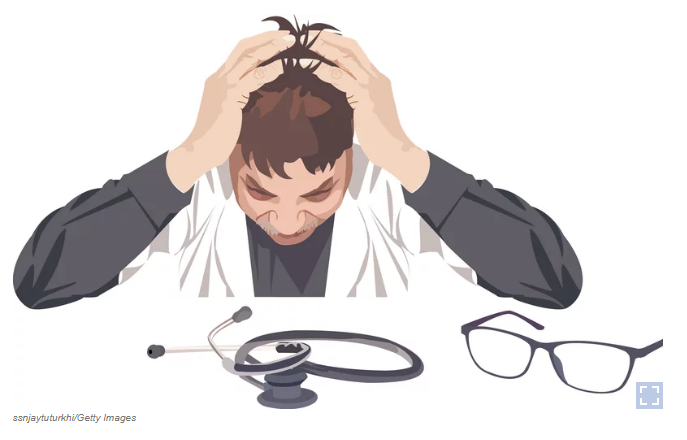Doctors have their own diagnosis: ‘Moral distress’ from an inhumane health system
By Lisa Doggett, Public Health Watch
August 2, 2023
 The young man was in his mid-20s when he came to see me for severe abdominal pain at my small community clinic. The pain, worse than any he’d ever experienced, had persisted for weeks and was getting worse. He cried out when I examined him.
The young man was in his mid-20s when he came to see me for severe abdominal pain at my small community clinic. The pain, worse than any he’d ever experienced, had persisted for weeks and was getting worse. He cried out when I examined him.
I didn’t know the cause of his pain, but I could think of possibilities, including a ruptured appendix, a perforated ulcer or pancreatitis. He needed an urgent CT scan and a surgical consult. The fastest way to get both was to send him to the emergency room.
But the man said he couldn’t go. He was uninsured.
As his family physician, I had to convince him. I explained the need for further evaluation, the risk of waiting. I told him the ER was legally bound to assess and stabilize him. They could arrange a payment plan. Still he hesitated, explaining that he couldn’t pay the bill.
This young man is one of many patients I’ve seen over the years who needed care and couldn’t afford it. I knew that hospital charges might exceed his annual payments for rent. He could face years of debt, even bankruptcy. I don’t recall his diagnosis, but I think he managed to improve without surgery. I still wonder: Was I too quick to send him for emergency care? Did I do more harm than good?
That feeling of ineptitude was a constant presence during the 13 years that I worked in public health clinics. I didn’t know it at the time – and my struggles were always eclipsed by the needs of my patients – but I was experiencing moral distress.
The terms “moral distress” and “moral injury” were first used in a military context to characterize the torment felt by soldiers as they tried to process and justify their actions amid the cruelty of war. In more recent years, these terms have been used to describe the feelings of guilt, sadness and defeat felt by health care professionals when we know what our patients need but can’t provide it.
At Austin’s CD Doyle clinic for people who are homeless, where I volunteer, nearly every patient has unmet needs impacting their health: a man with a foot infection from wearing wet boots—his only shoes—too long; another young man, new to Austin, hearing voices because he is out of his antipsychotic medication; others needing surgery, follow-up with a specialist, transportation. I have to steel myself against overwhelming feelings of helplessness when I’m there, wanting to assist, not knowing how.
[READ FULL ARTICLE HERE]
